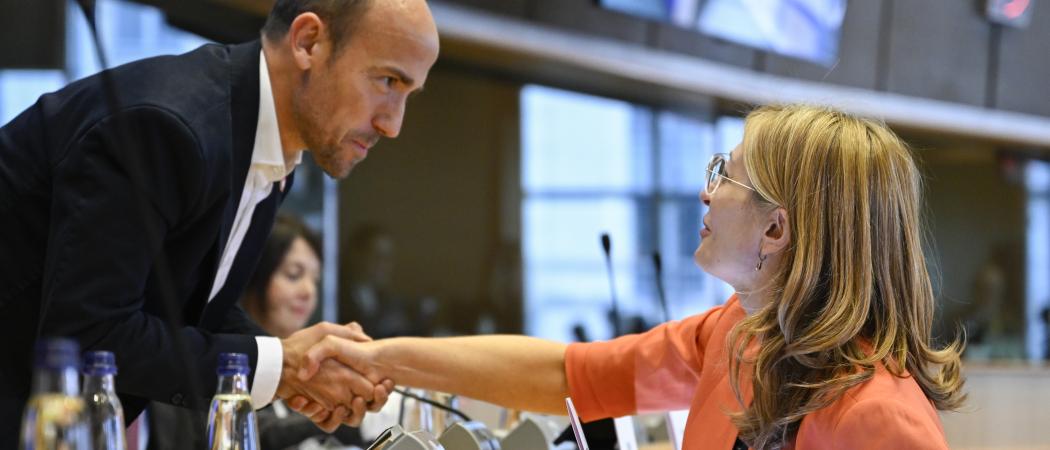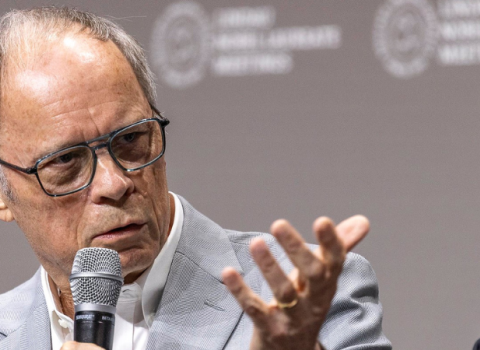The 60 current research partnerships may need streamlining to deliver the ‘strategic realignment’ Europe needs today

Ekaterina Zaharieva, the new commissioner for Start-ups, Research and Innovation, shaking hands with MEP Borys Budka at her confirmation hearing. Photo credits: Laurie Dieffembacq / European Union
In her first public outing, new research commissioner Ekaterina Zaharieva has called for “the courage to change approaches” and streamline research and innovation processes in a bid to boost Europe’s competitiveness.
“Closing the innovation gap is at the centre of the new competitiveness compass, and it will guide the work of the new Commission,” she told the European Partnership Stakeholder Forum.
As commissioner for Start-ups, Research and Innovation, Zaharieva promised to work on increasing research spending and simplifying access to funding, reiterating again the importance of reducing administrative burdens.
“To spend less time navigating the red tape, researchers must do research, innovators must do innovation,” she said. “Not spend half of their time reporting or drafting the applications, or other unnecessary requirements.”
In support of this, Zaharieva intends to trial a two-stage application process from 2025. She also has the ambition of linking up national research frameworks, saying that “27 different frameworks and strategies do not make a good European one.”
European partnerships demand high levels of coordination, and following on from Zaharieva, Hungary’s deputy state secretary for Innovation László Bódis proposed a discussion on “simplified and harmonised rules, alignment of procedures and the use of unified IT platforms.”
Zaharieva wants European-level partnerships to remain as a central plank of EU research, and in order for this to happen, said that simplification was the name of the game.
This calls for a streamlining of projects to avoid duplication. “We must ask ourselves: can a portfolio of 60 partnerships deliver the strategic alignment Europe needs today?” she added.
Full steam ahead
Echoing plans by Commission President Ursula von der Leyen to make research and innovation a priority in competing with non-EU powers, Zaharieva called for a hike in private investment and moves to incentivise SMEs and start-ups.
“R&I investments will determine tomorrow’s economy, industry and competitiveness,” she said.
To support this, the new research commissioner wants to promote “attractive careers, cutting edge infrastructure and a flow of talents and technologies” as part of the European Research Area (ERA) Act.
“Europe can’t afford to remain in the middle technology trap,” she stated. “Our efforts must focus on areas with disruptive potential, building on competitive advantage from green technologies to biotech, and productivity enhancing digital tech.”
Zaharieva’s focus on competitiveness has sparked concerns from researchers on whether or not Framework Programme 10, due to succeed Horizon Europe in 2028, could lose its standalone status and be placed within an overarching competitiveness fund.
Giorgio Gori, vice chair of Parliament’s ITRE committee on Industry, Research and Energy, said that ITRE was currently preparing recommendations for FP10, among which is “a substantially higher budget that would be sufficient for achieving the 3% GDP spending target, and for better alignment of EU and national funding and policies.”
“This is key to fill the competitiveness gap that we have with countries like the US and China,” he said.





 A unique international forum for public research organisations and companies to connect their external engagement with strategic interests around their R&D system.
A unique international forum for public research organisations and companies to connect their external engagement with strategic interests around their R&D system.